Unit 7 Memory Grammar课件(共37张PPT)
文档属性
| 名称 | Unit 7 Memory Grammar课件(共37张PPT) |

|
|
| 格式 | pptx | ||
| 文件大小 | 2.2MB | ||
| 资源类型 | 教案 | ||
| 版本资源 | 牛津深圳版 | ||
| 科目 | 英语 | ||
| 更新时间 | 2022-06-07 00:00:00 | ||
图片预览

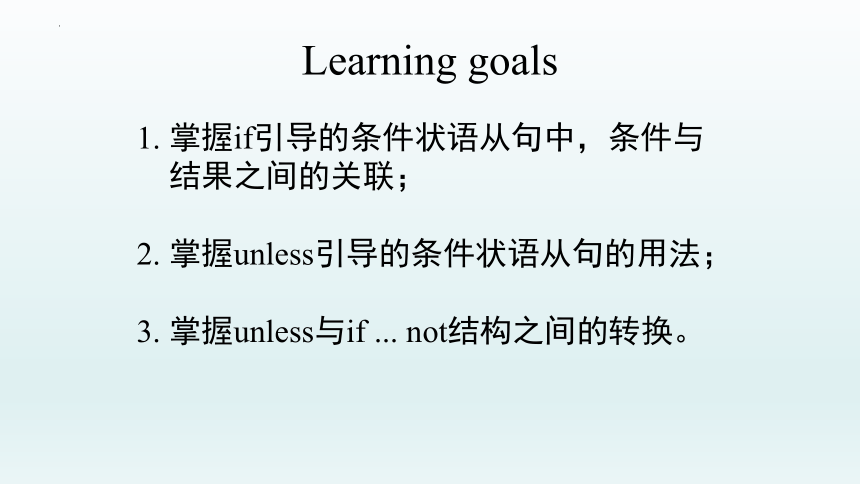
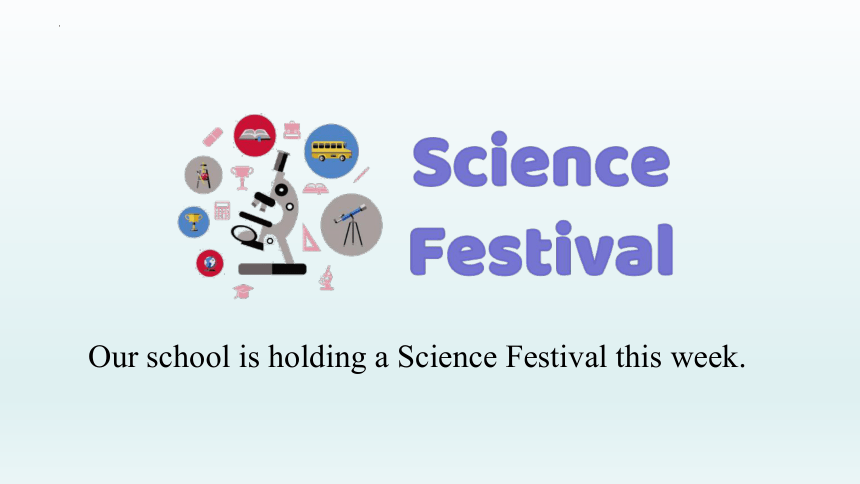
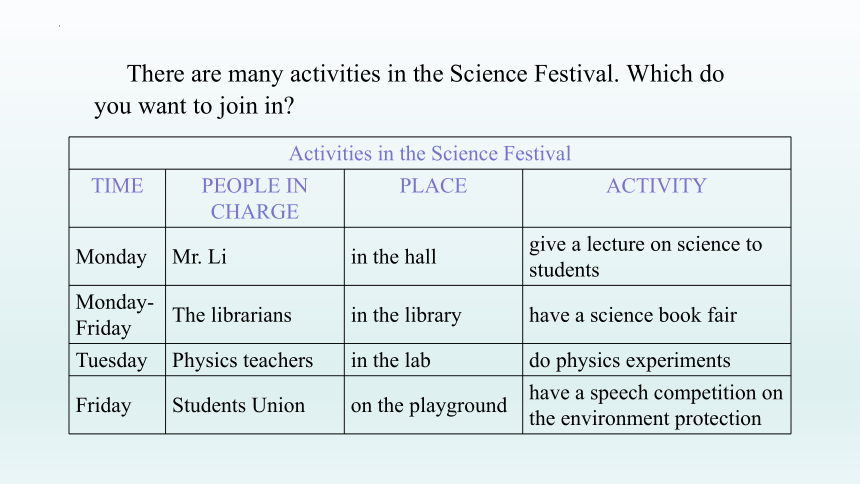

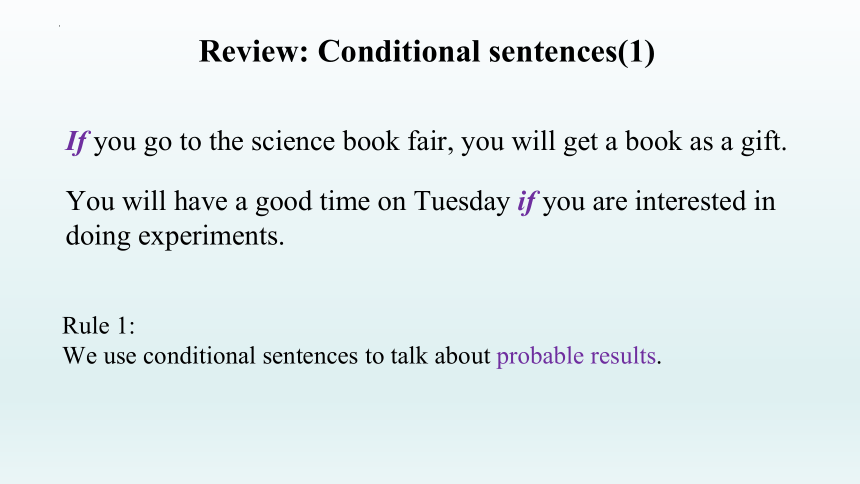
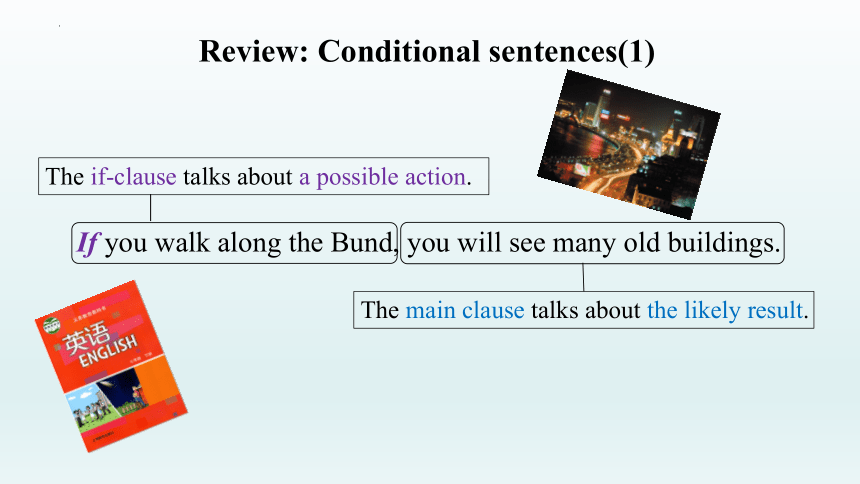
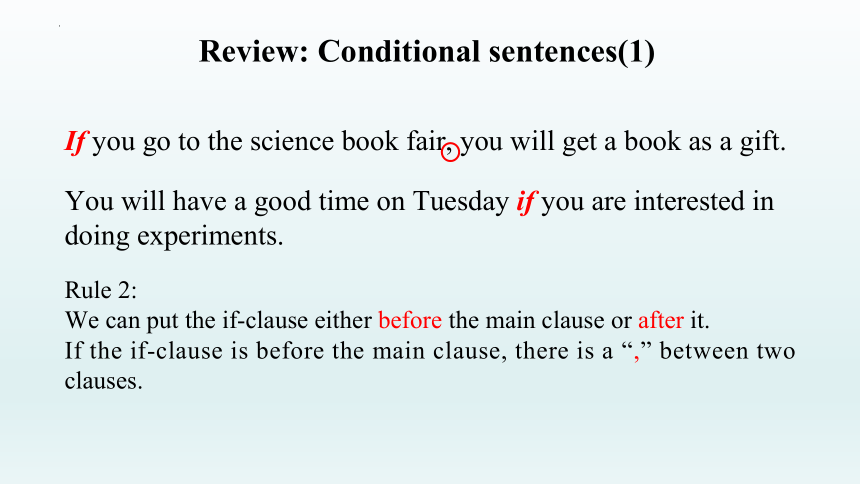
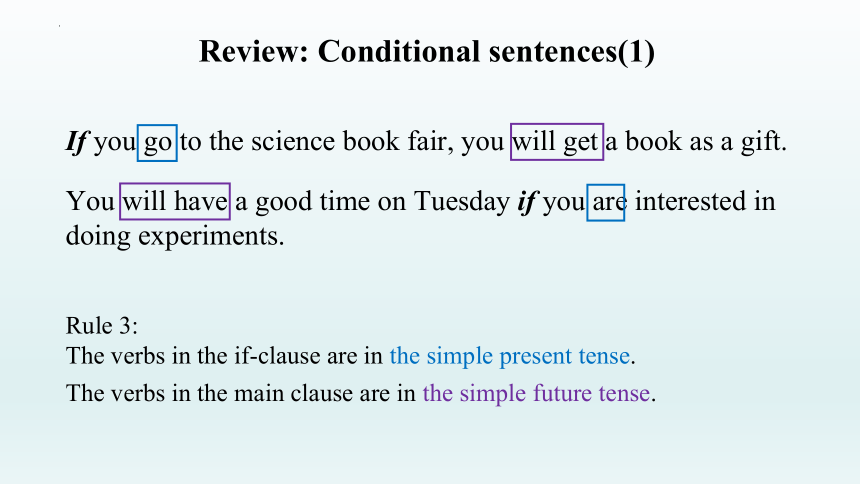

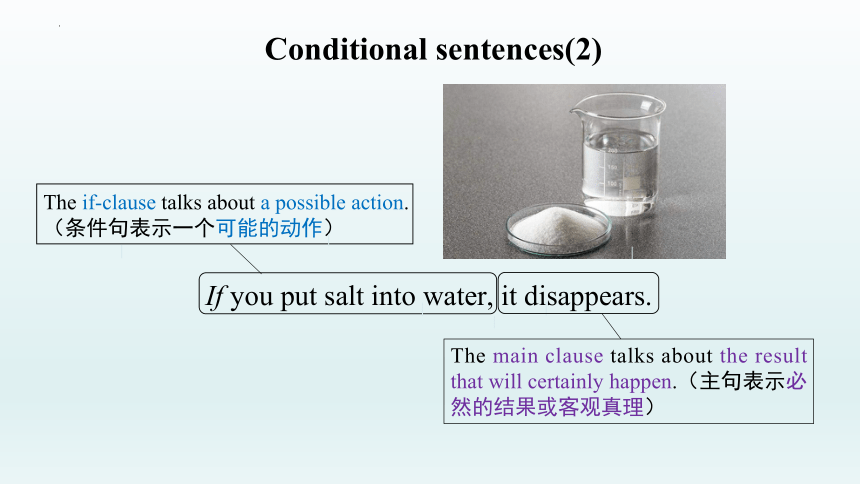
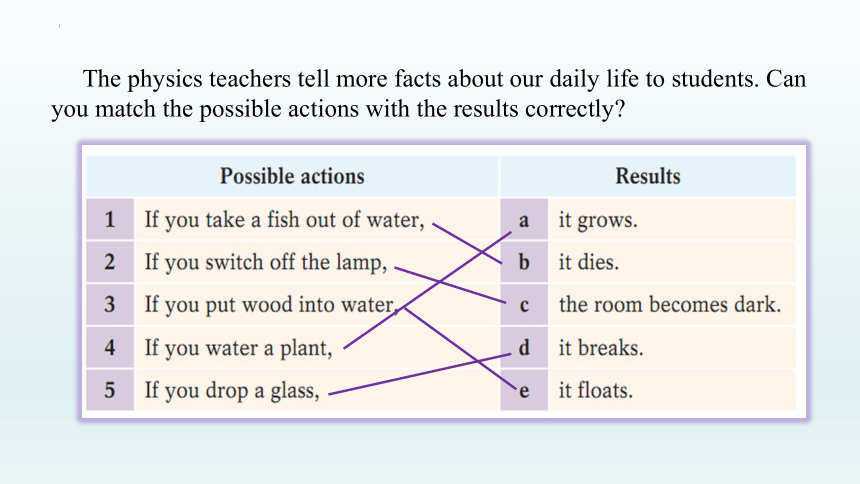
文档简介
(共37张PPT)
Unit 7 Memory
Grammar
Learning goals
1. 掌握if引导的条件状语从句中,条件与
结果之间的关联;
2. 掌握unless引导的条件状语从句的用法;
3. 掌握unless与if ... not结构之间的转换。
Our school is holding a Science Festival this week.
There are many activities in the Science Festival. Which do you want to join in
Activities in the Science Festival
TIME PEOPLE IN CHARGE PLACE ACTIVITY
Monday Mr. Li in the hall give a lecture on science to students
Monday-Friday The librarians in the library have a science book fair
Tuesday Physics teachers in the lab do physics experiments
Friday Students Union on the playground have a speech competition on the environment protection
Mr. Li gives a wonderful lecture about science. At the end of the lecture, he says:
“If you go to the science book fair, you will get a book as a gift.
You will have a good time on Tuesday if you are interested in doing experiments.”
If you go to the science book fair, you will get a book as a gift.
Review: Conditional sentences(1)
You will have a good time on Tuesday if you are interested in doing experiments.
Rule 1:
We use conditional sentences to talk about probable results.
Review: Conditional sentences(1)
The if-clause talks about a possible action.
The main clause talks about the likely result.
If you walk along the Bund, you will see many old buildings.
If you go to the science book fair, you will get a book as a gift.
Review: Conditional sentences(1)
You will have a good time on Tuesday if you are interested in doing experiments.
Rule 2:
We can put the if-clause either before the main clause or after it.
If the if-clause is before the main clause, there is a “,” between two clauses.
If you go to the science book fair, you will get a book as a gift.
Review: Conditional sentences(1)
You will have a good time on Tuesday if you are interested in doing experiments.
Rule 3:
The verbs in the if-clause are in the simple present tense.
The verbs in the main clause are in the simple future tense.
On Tuesday, the physics teachers show some experiments to students in the lab.
Conditional sentences(2)
If you put salt into water, it disappears.
The if-clause talks about a possible action.(条件句表示一个可能的动作)
The main clause talks about the result that will certainly happen.(主句表示必然的结果或客观真理)
The physics teachers tell more facts about our daily life to students. Can you match the possible actions with the results correctly
If you take a fish out of water, it dies.
If you switch off the lamp, the room becomes dark.
If you put wood into water, it floats.
If you water a plant, it grows.
If you drop a glass, it breaks.
Rule:
When we use a conditional sentence to talk about something that will certainly happen, both verbs should be in (the simple present tense/the simple future tense).
Conditional sentences(2)
Jason is really interested in the daily facts, can you find the facts with him
if/sneeze/close/you
1. Your eyes ____________________.
close if you sneeze
Exercise
a/candle/burn/light
2. If you _____________, it ______.
light a candle
burns
rain/in/wet/the/walk/get
3. If you______________, you________.
walk in the rain
get wet
you/heat/boils/if
4. Water ____________________ it.
boils if you heat
In the lab, some students are discussing with the teachers about the experiments, and other students are doing the experiments by themselves. A few students are talking about something else. Can you finish the following words of different people with the conditional sentences correctly
Exercise
1. When a student finishes doing an experiment, he says:
“If you heat ice, it _________(turn) into water.”
2. After showing an experiment, a teacher talks to students:
“If you have any question to ask, I___________(answer) you.”
3. A boy concludes his experiments:
“Oil ________(float) if you put it on water.”
turns
will answer
floats
4. A student talks to her friend:
“If I_______(finish) the speech script, I_________(take) part in
the speech competition on Friday.”
5. A girl asks her classmate whether it rains outside, her classmate
looks out of the window and tells her:
“The ground _____(get) wet if it ______(rain).”
will take
gets
finish
rains
if ... not and unless
On Thursday afternoon, the teacher tells students:
“We will hold a speech competition on the playground unless it rains tomorrow.”
= “We will hold a speech competition on the playground if it doesn't rain tomorrow.”
unless的用法
“We will hold a speech competition on the playground unless it rains tomorrow.”
= “We will hold a speech competition on the playground if it doesn't rain tomorrow.”
Rule 1:
unless是_______词性,意为_________________, 和if ... not
(如果……不……)意思接近,且两个结构可以互换使用。
连词
除非......要不然
Rule 2:
unless引导的部分是_____,其他部分是_______。从句可在主
句前,也可在主句后,当从句在主句前时______ 与主句隔开。
从句
主句
用逗号
= Unless it rains tomorrow, we will hold a speech competition on the playground.
unless的用法
“We will hold a speech competition on the playground unless it rains tomorrow.”
Rule 3:
unless引导的条件状语从句中,主句时态:___________,从句
时态: ____________。
unless的用法
“We will hold a speech competition on the playground unless it rains tomorrow.”
一般将来时
一般现在时
In the speech competition, students are talking about why we should protect trees. Many students share their opinions. Can you rewrite the sentences in the same meaning
1. If we don't stop cutting down the trees, many animals will lose their habitat.
2. We will also lose our home unless we protect the trees.
3. Unless people plant trees, there will be fewer forests.
4. Air will be worse if people don't save the forests.
Exercise
1. If we don't stop cutting down the trees, many animals will lose their habitat.
2. We will also lose our home unless we protect the trees.
= Unless we stop cutting down the trees, many animals will lose their habitat.
= We will also lose our home if we don't protect the trees.
4. Air will be worse if people don't save the forests.
3. Unless people plant trees, there will be fewer forests.
= If people don't plant trees, there will be fewer forests.
= Air will be worse unless people save the forests.
Kelly wins the first prize in the speech competition. Let's read her speech script (演讲稿)! But some words in the script are missing, can you fill them in
Ladies and gentlemen, good afternoon! I feel really happy to have the chance to talk with you here.
As we all know, a tree won't live if a person ________ (take) it away from the earth (泥土). Each creature has its own living environment. We should remember that. How will the world be like if there _______(be) fewer and fewer trees What ___________ (happen) if birds have no trees to live in Will animals die out if we _________ (do) anything to protect them Will there be only human beings in the end
It's time to do something. We will destroy our home planet unless everyone takes action and _______(protect) the Earth.
takes
are
will happen
don't do
protects
After the competition, students are talking about the weekend plan. Kelly invites Alan to see a film. Please complete the conversation between them.
Kelly: Alan, how about going to see a film tomorrow
Alan: Sorry, Kelly, I'm afraid I can't. I have to study all weekend.
Kelly: That's all right, Alan! In this case, I will study at home, too. My maths teacher tells me to study harder, or I'll fail the exam!
Alan: My maths teacher told me the same thing. She said, “I think you ________ (fail) the exam ______ you __________ (remember) the formulas (公式) you have studied.”
Kelly: I love basketball. However, _____ I _______ (spend) too much time playing basketball, I ________ (do) badly in my exams. So I ________ (stop) playing it _____ I _________ (not/pass) the maths exam.
Alan: You shouldn't stop doing sports. Doctors always say, “_____ you _______ (want) to keep fit, you _______ (have) to do more exercise.”
Kelly: Yes, our brains_______ (work) better _______we _______ (be) healthy.
will fail
unless
remember
if
spend
will do
will stop
if
don't pass
If
want
have
work
if
are
(1) if引导的条件状语从句可表示条件和结果之间存在必然联系;
1. if条件状语从句新用法:
(2) 当表示客观事实、结果时,if条件句的主句和从句都用一般现在时。
Summary
谈论将来可能出现的情况时,if引导的条件状语从句用一般现在时,表示结果的主句用一般将来时。
if引导的条件状语从句
eg:
If I am free tomorrow afternoon, I will go shopping.
If you don't hurry up, you will be late for work.
主将从现
谈论客观真理、客观事实和普遍现象等必然发生的事情时,if引导的条件状语从句用一般现在时,表示结果的主句也用一般现在时。
if引导的条件状语从句
eg:
If spring comes, trees turn green.
If you heat metal, it melts.
主现从现
特别注意:句中的主语是三单时,谓语动词要加s或es
2. unless条件状语从句用法:
(1) unless意为 “除非”,和if ... not(如果……不……)可以互换使用;
(2) unless从句可在主句前,也可在主句后,在主句前时用逗号与主句隔开。时态为主将从现。
Summary
Can you write a speech script on environment protection It's better to use the sentences with if ... not or unless.
Homework
Thank you
Unit 7 Memory
Grammar
Learning goals
1. 掌握if引导的条件状语从句中,条件与
结果之间的关联;
2. 掌握unless引导的条件状语从句的用法;
3. 掌握unless与if ... not结构之间的转换。
Our school is holding a Science Festival this week.
There are many activities in the Science Festival. Which do you want to join in
Activities in the Science Festival
TIME PEOPLE IN CHARGE PLACE ACTIVITY
Monday Mr. Li in the hall give a lecture on science to students
Monday-Friday The librarians in the library have a science book fair
Tuesday Physics teachers in the lab do physics experiments
Friday Students Union on the playground have a speech competition on the environment protection
Mr. Li gives a wonderful lecture about science. At the end of the lecture, he says:
“If you go to the science book fair, you will get a book as a gift.
You will have a good time on Tuesday if you are interested in doing experiments.”
If you go to the science book fair, you will get a book as a gift.
Review: Conditional sentences(1)
You will have a good time on Tuesday if you are interested in doing experiments.
Rule 1:
We use conditional sentences to talk about probable results.
Review: Conditional sentences(1)
The if-clause talks about a possible action.
The main clause talks about the likely result.
If you walk along the Bund, you will see many old buildings.
If you go to the science book fair, you will get a book as a gift.
Review: Conditional sentences(1)
You will have a good time on Tuesday if you are interested in doing experiments.
Rule 2:
We can put the if-clause either before the main clause or after it.
If the if-clause is before the main clause, there is a “,” between two clauses.
If you go to the science book fair, you will get a book as a gift.
Review: Conditional sentences(1)
You will have a good time on Tuesday if you are interested in doing experiments.
Rule 3:
The verbs in the if-clause are in the simple present tense.
The verbs in the main clause are in the simple future tense.
On Tuesday, the physics teachers show some experiments to students in the lab.
Conditional sentences(2)
If you put salt into water, it disappears.
The if-clause talks about a possible action.(条件句表示一个可能的动作)
The main clause talks about the result that will certainly happen.(主句表示必然的结果或客观真理)
The physics teachers tell more facts about our daily life to students. Can you match the possible actions with the results correctly
If you take a fish out of water, it dies.
If you switch off the lamp, the room becomes dark.
If you put wood into water, it floats.
If you water a plant, it grows.
If you drop a glass, it breaks.
Rule:
When we use a conditional sentence to talk about something that will certainly happen, both verbs should be in (the simple present tense/the simple future tense).
Conditional sentences(2)
Jason is really interested in the daily facts, can you find the facts with him
if/sneeze/close/you
1. Your eyes ____________________.
close if you sneeze
Exercise
a/candle/burn/light
2. If you _____________, it ______.
light a candle
burns
rain/in/wet/the/walk/get
3. If you______________, you________.
walk in the rain
get wet
you/heat/boils/if
4. Water ____________________ it.
boils if you heat
In the lab, some students are discussing with the teachers about the experiments, and other students are doing the experiments by themselves. A few students are talking about something else. Can you finish the following words of different people with the conditional sentences correctly
Exercise
1. When a student finishes doing an experiment, he says:
“If you heat ice, it _________(turn) into water.”
2. After showing an experiment, a teacher talks to students:
“If you have any question to ask, I___________(answer) you.”
3. A boy concludes his experiments:
“Oil ________(float) if you put it on water.”
turns
will answer
floats
4. A student talks to her friend:
“If I_______(finish) the speech script, I_________(take) part in
the speech competition on Friday.”
5. A girl asks her classmate whether it rains outside, her classmate
looks out of the window and tells her:
“The ground _____(get) wet if it ______(rain).”
will take
gets
finish
rains
if ... not and unless
On Thursday afternoon, the teacher tells students:
“We will hold a speech competition on the playground unless it rains tomorrow.”
= “We will hold a speech competition on the playground if it doesn't rain tomorrow.”
unless的用法
“We will hold a speech competition on the playground unless it rains tomorrow.”
= “We will hold a speech competition on the playground if it doesn't rain tomorrow.”
Rule 1:
unless是_______词性,意为_________________, 和if ... not
(如果……不……)意思接近,且两个结构可以互换使用。
连词
除非......要不然
Rule 2:
unless引导的部分是_____,其他部分是_______。从句可在主
句前,也可在主句后,当从句在主句前时______ 与主句隔开。
从句
主句
用逗号
= Unless it rains tomorrow, we will hold a speech competition on the playground.
unless的用法
“We will hold a speech competition on the playground unless it rains tomorrow.”
Rule 3:
unless引导的条件状语从句中,主句时态:___________,从句
时态: ____________。
unless的用法
“We will hold a speech competition on the playground unless it rains tomorrow.”
一般将来时
一般现在时
In the speech competition, students are talking about why we should protect trees. Many students share their opinions. Can you rewrite the sentences in the same meaning
1. If we don't stop cutting down the trees, many animals will lose their habitat.
2. We will also lose our home unless we protect the trees.
3. Unless people plant trees, there will be fewer forests.
4. Air will be worse if people don't save the forests.
Exercise
1. If we don't stop cutting down the trees, many animals will lose their habitat.
2. We will also lose our home unless we protect the trees.
= Unless we stop cutting down the trees, many animals will lose their habitat.
= We will also lose our home if we don't protect the trees.
4. Air will be worse if people don't save the forests.
3. Unless people plant trees, there will be fewer forests.
= If people don't plant trees, there will be fewer forests.
= Air will be worse unless people save the forests.
Kelly wins the first prize in the speech competition. Let's read her speech script (演讲稿)! But some words in the script are missing, can you fill them in
Ladies and gentlemen, good afternoon! I feel really happy to have the chance to talk with you here.
As we all know, a tree won't live if a person ________ (take) it away from the earth (泥土). Each creature has its own living environment. We should remember that. How will the world be like if there _______(be) fewer and fewer trees What ___________ (happen) if birds have no trees to live in Will animals die out if we _________ (do) anything to protect them Will there be only human beings in the end
It's time to do something. We will destroy our home planet unless everyone takes action and _______(protect) the Earth.
takes
are
will happen
don't do
protects
After the competition, students are talking about the weekend plan. Kelly invites Alan to see a film. Please complete the conversation between them.
Kelly: Alan, how about going to see a film tomorrow
Alan: Sorry, Kelly, I'm afraid I can't. I have to study all weekend.
Kelly: That's all right, Alan! In this case, I will study at home, too. My maths teacher tells me to study harder, or I'll fail the exam!
Alan: My maths teacher told me the same thing. She said, “I think you ________ (fail) the exam ______ you __________ (remember) the formulas (公式) you have studied.”
Kelly: I love basketball. However, _____ I _______ (spend) too much time playing basketball, I ________ (do) badly in my exams. So I ________ (stop) playing it _____ I _________ (not/pass) the maths exam.
Alan: You shouldn't stop doing sports. Doctors always say, “_____ you _______ (want) to keep fit, you _______ (have) to do more exercise.”
Kelly: Yes, our brains_______ (work) better _______we _______ (be) healthy.
will fail
unless
remember
if
spend
will do
will stop
if
don't pass
If
want
have
work
if
are
(1) if引导的条件状语从句可表示条件和结果之间存在必然联系;
1. if条件状语从句新用法:
(2) 当表示客观事实、结果时,if条件句的主句和从句都用一般现在时。
Summary
谈论将来可能出现的情况时,if引导的条件状语从句用一般现在时,表示结果的主句用一般将来时。
if引导的条件状语从句
eg:
If I am free tomorrow afternoon, I will go shopping.
If you don't hurry up, you will be late for work.
主将从现
谈论客观真理、客观事实和普遍现象等必然发生的事情时,if引导的条件状语从句用一般现在时,表示结果的主句也用一般现在时。
if引导的条件状语从句
eg:
If spring comes, trees turn green.
If you heat metal, it melts.
主现从现
特别注意:句中的主语是三单时,谓语动词要加s或es
2. unless条件状语从句用法:
(1) unless意为 “除非”,和if ... not(如果……不……)可以互换使用;
(2) unless从句可在主句前,也可在主句后,在主句前时用逗号与主句隔开。时态为主将从现。
Summary
Can you write a speech script on environment protection It's better to use the sentences with if ... not or unless.
Homework
Thank you
